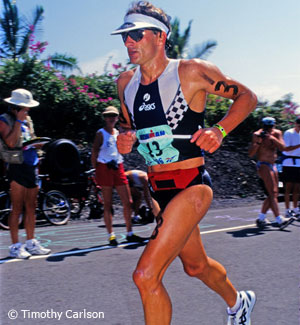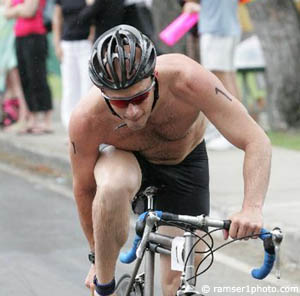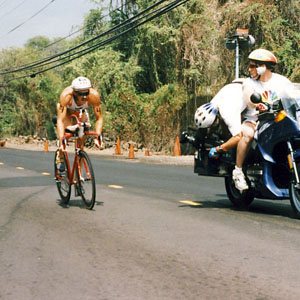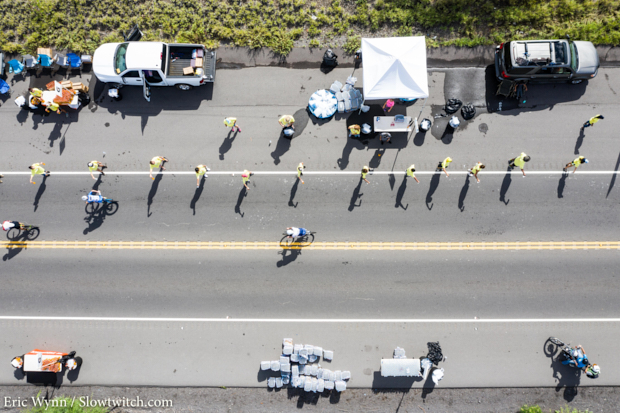Dirk Aschmoneit – A new start
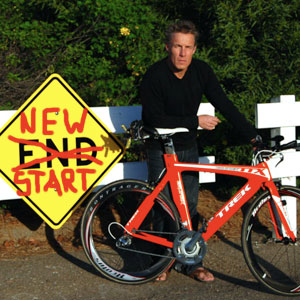
When Dirk Aschmoneit won Ironman New Zealand in 1991 he was the first German to win an Ironman. He retired in 1994 because of injuries but recently his name appeared again in triathlon results. Slowtwitch checked in with this new Team Timex recruit.
ST: Dirk, how did you become involved in the sport of triathlon in the first place?
Dirk: Honestly, “failure” in my 1st triathlon race got me hooked. Let me tell you the story.
During my military service (it’s mandatory in West Germany) the seals team (Kampfschwimmer) recruited me in 1983 to be part of a 5 man team for one of the first triathlons in Germany in the town of Koblenz. I had no idea what Triathlon was but they showed me an article in the Stern Magazine about the Ironman in Hawaii and my first thought was “this is crazy and will not get big outside the US”. The race was a middle distance race over 1-80-25 km. I had an old Motobecane bike that I haven’t ridden for more than 3 years and my bike experience was based on 6 mile roundtrips to school. That really wasn’t a concern at that point. The reason the seals recruited me was based on my 1:54 over 200 Freestyle and winning the 5,000 meter in 15:00 at the Navy National Track & Field Championships that spring. So, race day is on and I’m 1st out of the water. On the bike a group of 6 to 8 riders is catching up to me and I was able to stay with them. We get into T2 and I’m looking forward to the run…with a 1:22 PR over 25km I felt confident…but that confidence turned into absolute agony after a couple miles. Every other mile my quads cramped up so bad that I had to stop and stretch. At the end I finished in 25th place and I considered that an absolute failure! That day I told myself “there is no way I can’t train my body to do this!.”
On top of that I knew that my 77 VO2 Max was not a bad foundation and I was blessed with most likely one of the world’s biggest hearts. At a stress test at the German Sport Institute in Warendorf they told me that I had the biggest relative heart size ever measured in West Germany. With a 1512ml heart and 72kg (158lbs) weight I was able to get more oxygenated blood to my muscles than any other athlete they ever tested. Another way to look at it: I realized that my heart was bigger than the engine of the car I drove at that time. (Ford Escort 1.4 L)
The following year I won the European Long Course Championships and started a 10 year triathlon career.
ST: You were the first German to win an Ironman in 1991. Do you think many people know that tidbit?
Dirk: In Germany most people are aware of that fact. Outside of Germany I don’t think many people are aware of that fact. Outside Germany athletes like Wolfgang Dittrich, Juergen Zaeck are more associated with the German invasion of good triathletes. Wolfgang due to his 1st out of water and associated TV coverage at IM Hawaii, Juergen due to his prowess on the bike and record setting rides in Kona.
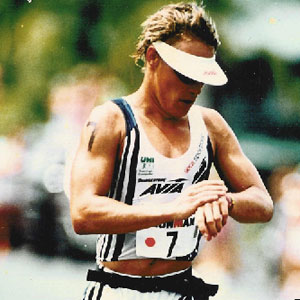
ST: Talk about that day in New Zealand.
Dirk: New Zealand was a perfect day. Everything came together that day. 6 month before I started working with an Olympic cycling coach – he also worked with Jan Ulrich when Jan was a junior – and my training shifted dramatically. No more 7 day schedules that most athletes and coaches followed because the week has 7 days. The schedule was 10 to 12 days and 2 days off. The main difference to what I was going until than was that I had to learn to actually take days off to get fast and to spent most of my training outside the comfort zone of 75 to 85% of Max HR. By the time IM NZ rolled around I already had 2 altitude camps in my system and had the opportunity to train in SD with ST, Mark Allen and Kenny Souza for over 3 months.
The swim wasn’t anything spectacular and I was 2nd out of the water. By the time we left T1 I was in 1st place and never looked back. The original bike course in NZ is fairly hilly and suits my riding style. At the turn around I had 1o minutes on the chase group (ST, Browning, Molina, Glah, Huddle, etc.) and felt great. My heart rate was still at 167 or 88% of MAX and right where it was supposed to be. In the past I struggled with the nutrition part in an IM and was perplexed when my HR would drop to 145 after 4 hours into the race. My coach educated me on the energy balance during the race and I was religiously taking 50 grams of Carbs every 20 to 30 minutes. When I hit T2 they told me that I missed the bike course record by 3 seconds but was 12 minutes ahead of the chase group. At that point I knew that I will win this race if I just stay calm and run a 2:50 as planned. Somebody had to run 2:38 to get me on a hilly course and that hadn’t been done in an IM. A 2:50 marathon sealed it and the 8:30 set a new course record that still stands today! (They changed the course 9 years later, but big names like De Boom tried to break my record and missed it by 2 minutes)
ST: Tinley and you had a pretty good battle in Roth in 1996. Did the German audience go nuts?
Dirk: It was 1986 and yes it was a race that the Germans truly embraced. The newspapers called me “German Rambo” after that race and it set the stage for the “Legend” status in Germany. Another thing I learned at that point is. It doesn’t matter how many races you win. All that matters is that you win the one that gives you big media exposure. The race with Tinley did exactly that. It put Roth as a race on the planet and established me as one of the European Challengers.
ST: Looking back, what was your favorite race or races?
Dirk: My favorite race was the Long Course World Championships in Nice 1985. All pros boycotted IM Hawaii that year since Hawaii didn’t pay prize money. I placed 5th behind Allen, Dave Scott, Rob Barrel and Molina…that race got me on the Winning Club team. Full sponsorship, the best material, all travel and races paid…that was great at that point.
Other races that go in my top 3 to 5 are: National Championships 1986 in Roth – the battle with Tinley and crushing the field by over 10 minutes over the 2-80-25km distance.
IM Hawaii 1988 when I finished 7th and most certainly IM NZ 1991 with a 1st place and course record performance.
ST: When did you retire from the sport?
Dirk: I had to retire in 1994 due to a broken back and spinal cord injury. I never made an official announcement about my retirement and there are so many weird stories out there. Maybe it’s time to set the record straight. Starting at the age of 11 I complained about back pain but was told to toughen up and stop complaining. “You are too young to have back pain” and there was no reason to check via x-ray for any actual damage. Well, years of activity will catch up with you and in 1989 (age 27) x-rays revealed a shifting of the spine in the lumbar section (Spondolythesis). Prescription: strengthen your core and you should be good to go. By 1994 my left leg started shutting down on long rides or runs. Finally an MRI exposed the real deal. Pars Defect with Spinal Stenosis…translation please: Broken back and compression of the spinal cord.
Long story short. Turns out that I broke my back at the age of 9 when I fell of a tree and broke my leg as well. The doctors treated the obvious – the broken leg – but never checked my back. All these years I raced with a broken back, outch! Looking back, I wonder what I could have accomplished with a healthy back.
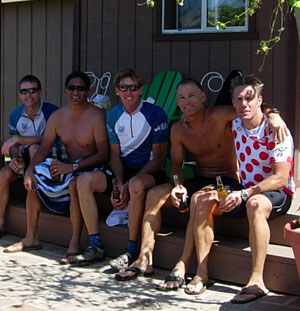
ST: What made you decide to get into it again?
Dirk: There are several factors. The main one is to set a role model for my kids. They are 9 and 11 and I never pushed them to do a sport. I expose them to a variety of sports with the hope that they will pick one and get serious. My kids know about my background but had no real understanding of what it really means until they watched me at IM Arizona. Before the race my son told me I’m crazy to do this IM stuff. After the race he told me that he wants to do a quarter, than a half and after that an IM. I had tears in my eyes and those words where more important to me than anything I achieved in the sport ever!
Another reason is that my spine was finally readjusted and fused in 2003 after waiting 10 years for the right procedure. That means I had to stop all sports except some swimming for 10 years. My weight went from 158 lbs to 205 lbs and I was now part of the growing obesity trend in the US. After 2 mayor surgeries in Nov and Dec of 2003 it took 2 years of rehab to be able to run 20 minutes. After watching Norman and Faris win Hawaii I just couldn’t resist anymore. My wife sensed it as well and she actually can’t stand if I just work out with no particular race in mind. She pushed me to enter IM Arizona and in May of 2008 I started my 26 week prep for IM AZ with the goal to qualify fro Kona. You know the result…9:35 and yes, Kona here I come.
Last, but not least, I had a great support group – see picture just above – with lots of trash talk to keep me motivated. Thanks again to Dean, Corky, and Mike for fueling my motivation – some speculate it was the Corona, but I’m talking about the spiritual motivation!
ST: How different is racing now compared to the early 90s?
Dirk: The couple of warm up races felt not that much different but when I raced IM Arizona I was truly impressed about the professionalism and attention to detail that went into that race. I can’t wait to go to Hawaii and indulge. One big difference today are the aid stations. Every mile an aid station on the run with food and fluids…dude, we didn’t have that in the old days. Another difference is the 10 minute head start for the pros and wave starts at a lot of races. I wish they would have sent the pros off 10 minutes early in the old days. It makes for a better race, especially on the crowded bike segment of the course.
The wave starts are a good thing but at this point I would rather race head to head with the entire field. Starting 30 to 120 minutes behind the elite and ending up placing top ten is not my thing. If you are in 10th place you should cross the finish line in 10th place! Not an hour after the winner. My kids already asked: “Dad, why don’t you race pro, we are tired of waiting for you!?” Yeah, right! (On the other hand it would be an interesting challenge! Let’s see how I do in 2009 and let’s go from there)
ST: Is the depth of the field or the technology nowadays more amazing to you?
Dirk: When I heard that there are 100 pros at the start at IM AZ I was comparing that to the old days with maybe 50 pros at the start. Depth of the field is definitely growing but honestly, when I passed several pros at IM AZ – keep in mind they had a 10 minute head start and I passed them on the 2nd loop – I was questioning in my head if the quality improved. Maybe there is more quantity but I’m still trying to figure out if the quality of the field grew. In the age groups it is a fierce battle and I think that there is more depth in the age group field now.
Technology wise I think we evolved a lot. Timing chips and real time online tracking. That is awesome. I guess I will have my phone with me on the next IM and have my son beam me updates during the race, ha. The other big evolution I realized is training with Power. I don’t go on my bike unless there is a power meter attached to it. It is so much more fun to bike now since you get immediate feedback on how you are really doing.
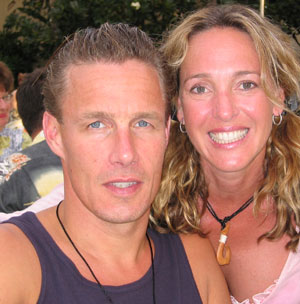
ST: What are you up to these days?
Dirk: After retiring in 1994 I played with the thought to go back to med school and finish my degree in orthopedic surgery. But looking at my age at that point (32), the financial picture and the timeline (Fully finished at the age of 42 or so) it was too daunting. In Germany the education is free and in the US I was facing $40,000 (resident alien rates) a semester at USC. At the end I decided to get to work and started in the sporting goods industry until I was recruited into the weight loss industry in 1997. For the past 5 years I work for Jenny Craig – a division of Nestle. As Director of Marketing I direct all product development and management activities. (BTW, Nestle owns also Powerbar).
ST: Talk about your family if you could.
Dirk: Sure. I met my wife in 1983 during a stay in Coronado, CA. It is pretty ironic but I met her the same day my mother died back at home…but that’s another story. We where good friends and nothing more for 5 years until we met again in 1990 and both of us where single. In 1991 we got married. She grew up in the retail world and after we had two kids she stayed home and started a very successful real estate career. My son Nicholas is now 12 and my daughter Anastasia is 10. They are delightful, polite and intelligent kids. My wife did a great job raising them! I’m way too impatient to deal with some of the stuff that goes with raising kids. My wife is half Italian and came from a family of 5, so to her it comes naturally. I’m an only child, spent my first 2 years in an orphanage and another 3 years in a foster home before my mom took me back at the age of 6. I never got that warm and fuzzy family thing down but I’m trying. Since I really never had a family it is of absolute importance to me that I’m there for my kids or wife whenever they need me. I tell you, it was devastating when my dad – who left my mom before I was born – started to contact me once I became famous. I have a real hard time with that and never really let him come close. I don’t want that my kids grow up without parents.
ST: How did that rumor about you being married to Liz Downing get started?
Dirk: There seems to be some misunderstanding. I think the whole thing started on the web and I have to smile every time. I don’t even know Liz Downing…I hope she is good looking!
My wife was a gymnast and is very athletic but not at a pro level.
ST: How much do you train these days?
Dirk: As much as family, work and my health allow me to do. My orthopedic surgeon told me after the spinal fusion that I have to give up running. Well, it took me 2 years to run 20 minutes but I’m not giving up, yet. Most of my training happens at 4 to 7am and my long rides happen on the weekend. I can’t work out after work since it is all about home work with the kids and family time.
A typical week is three to four 45min swims with Masters, two to three runs for a total of 20 to 35 miles, and three to four rides. Since I don’t have restrictions from the doctor on the bike I compensate for the low running mileage here. In the work week I do all my training on a Cycleops PT300 at 4 am. On the weekend I ride in the mountains and go 70 to 150 miles a day with 4,000 to 15,000 feet of climbing.
For this season I can start off such a better foundation and hopefully get my running mileage up in the 60 to 80 mile/week range. One thing is for sure, having a full time job doesn’t make it easy to keep a regular schedule. On the other hand I welcome the challenge of keeping work, family and training balanced. There is no time for garbage miles. Every training session has a mission and is executed 100%…no time to screw around.
In terms of how the week breaks down here is a general schedule:
Day: winter/spring – summer/fall
Mon: Recovery – Recovery
Tue: Easy to Moderate – Power Intervals
Wed: Power Intervals – Easy to Moderate
Thu: LT Intervals – LT/Tempo Intervals
Fri: Endurance – Easy to Moderate
Sat: Endurance – Power Intervals
Sun: Endurance – Endurance
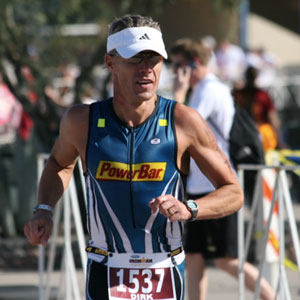
ST: Do you follow any other sports?
Dirk: I follow many sports but I’m not addicted to any one of them. Whenever the German soccer team is playing in a championship game you bet I’m watching it. Love to watch the Tour. Swimming if they ever put it on TV. Triathlon same thing.
ST: Can you share with us some of your food likes and dislikes?
Dirk: My favorite two “food groups”…Ice Cream and Cookies. No wonder I have to watch my weight all the time. Other than that I basically eat everything. Not a big fruit fan. Favorite dishes are Beef Stroganoff and Spaghetti Carbonara.
ST: What music do you like?
Dirk: We grew up listening to more British music I guess and I’m still listening to that kind of music. Genesis, David Bowie, Queen are on the top of my list. Having a 9 year old daughter I get exposed to Hannah Montana and Fergie…I can’t believe they call that music.
ST: What was the last book you read?
Dirk: Honestly, I don’t have much time to read and if I read it has to be about economics, marketing, exercise physiology or biographies (e.g. Michael Dell, Bill Bowerman/Nike, Freak-onomics – which BTW is totally overrated). If I can’t apply the content directly to work or life in general I’m not interested in reading.
ST: Where do you see yourself in 5 years?
Dirk: That is a good question and doesn’t come with an easy answer considering the current economic pressure. Nestle is a big company and has vast opportunity for growth. In order to move up the chain you have to be willing to move from either company to company or country to country or both. I’m blessed with having great mentors and they will guide me down the right path. When it comes to the Sport, I can’t just participate. My goal will always be to win or go after a record. Records are meant to be broken, right.
ST: Is there anything else we should know about you?
Dirk: I think I already “talked” your ear off by now. Is there anything I didn’t cover?
ST: Dirk, I think we are good. 🙂



